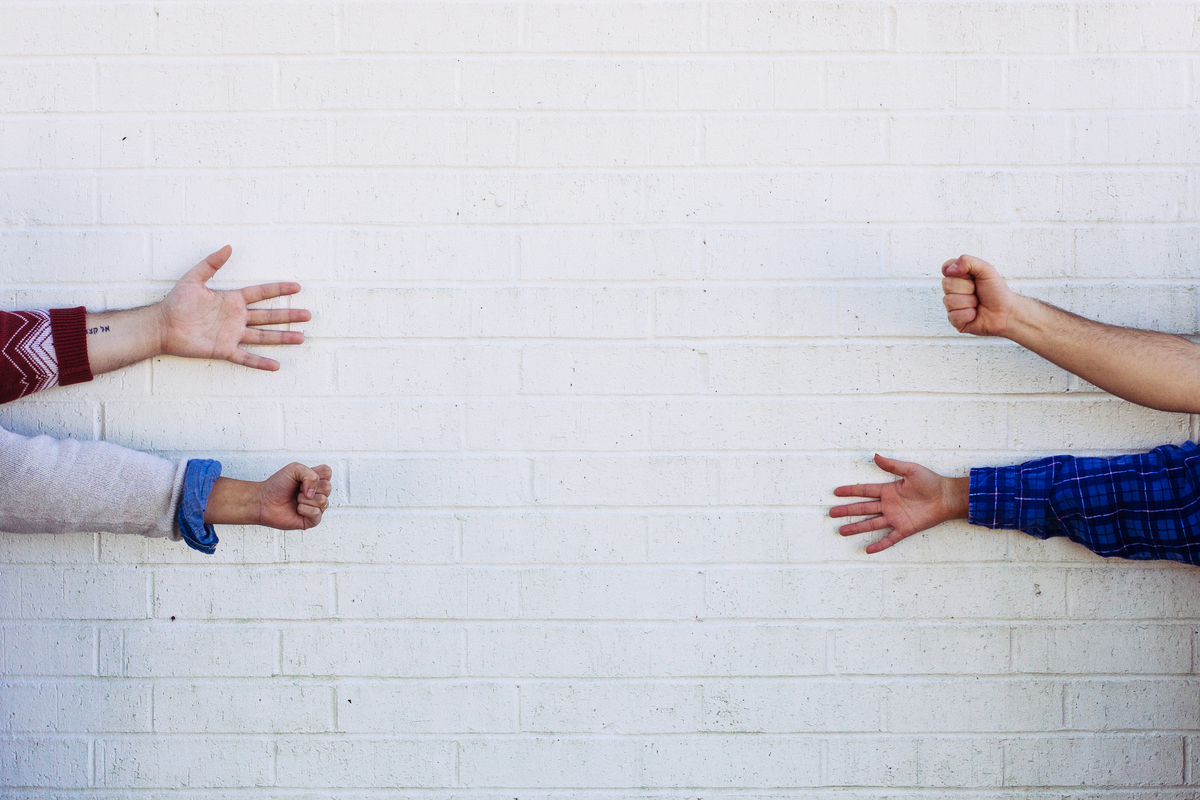We human beings tend to be emotionally lazy.
We’re prone to taking the thought process of least resistance. As we move through the day and people cross our paths, we usually settle for whatever feelings come immediately, the ones that don’t take much work; the knee-jerk responses they trigger in us upon contact, whether this is affection or contempt. As a result, we usually don’t spend much time concerning ourselves with those who disagree with us—their complexity, their stories, their internal condition.
At the unnaturally accelerated pace we live and move through the world, we simply don’t have time to linger with people long enough to really see them or hear them, let alone imagine they might have a perspective we could learn from—or worse yet, that we might actually like them. We grab a quick cue from their profiles: a political affiliation, a religious expression, a retweet source, and on that spindly, fragile skeleton, we instantly create a human being we can attach all our fears, biases, and past wounds to.
Toxic tribalism thrives in such relational shorthand. I can view someone across the social media chasm, and in an instant I can size them up, remove any nuance or humanity, and fully caricaturize them into the irredeemable adversary I need. That makes hating them much easier for me—and hating them is just a hell of a lot quicker and simpler than knowing or understanding them.
People ask me all the time, “How do we move forward when there is so much bitterness and discord in the world?” They usually don’t like the answer—although I don’t like it much either.
We’re all going to have to figure out how to do the difficult work of loving people we dislike.
We’re going to have to stop creating false stories about people from a safe distance, and get truer stories.
We’re going to have to find a way to offer an open hand as often as a clenched fist.
We’re going to need to slow down enough, and get close enough proximity to our supposed enemies, so that we can look in the whites of their eyes and find the humanity residing there. It may be buried in jagged, ugly layers of fear and grief and hopelessness—but it is almost always there.
I don’t like to think about the humanity of people when they are acting inhumanely, mostly because I don’t want them to get away with something. I don’t want to risk giving tacit consent to the terrible things they do, to the wounds they inflict, to the violence they manufacture—and the simplest way to do this, seems to be to despise them.
A few months ago I was speaking at an event in California that was visited by the Proud Boys, a group of Alt-Right activists known for physical intimidation and violence. They’d spent the first forty minutes of our event laughing sarcastically and yelling over our speakers, while waving signs and live streaming the event to their followers and fans. I took the platform, already fully enraged, adrenaline coursing wildly through me like a mid-Hulkout Bruce Banner—and proceeded to shout loudly and without stopping to breathe (lest I give the protestors a space to be heard.) Like a deranged, pissed-off auctioneer, I finished my message about the love of God, which I’d screamed until my throat was raw. The irony was not lost on me.
My dear friend Genesis B. took the platform immediately following me. Gen is a queer woman of color and a poet, and probably twenty years younger than me. As she began to softly speak, the Proud Boys began to heckle her as they did myself and the previous speakers—but she responded differently.
“Before I share my story,” she said, “I want to speak to my potential future co-collaborators back there.” Looking directly at them she said, “I don’t see you as my enemies, but my potential co-collaborators.”
Then she went further. She smiled and said, “I want to know if any of you would be willing to come up here and embrace me.” The crowd stilled to silence.
A man began walking from the back row, still recording. He jumped up onto the platform, and Genesis opened her arms widely and hugged him tightly and told him she loved him, and he responded in kind. The man soon returned to his place at the back of the crowd, and continued to talk back the rest of the night, but never as loudly or angrily as he had.
I don’t know if Genesis’ actions changed this man—but they changed many of us.
They changed me.
Later, as we were sharing our reflections of the evening, Genesis said, “I’ve met people like this before, and so I wasn’t scared. I know they’re terrified of me.”
She, far more than a cisgender hetero white guy like myself, had reason not to let these people off the hook. And that’s the point—she didn’t. She saw their humanity, showed them her own, and left it in their hands whether they were going to honor that or not.
Hating people is always going to be the easier and more expedient path than loving them, because loving them means seeing them fully, hearing their story, stepping into their skin and shoes as best we can, and finding something worth embracing.
I wonder if we can do that.
I wonder if I can.
Get John’s book ‘HOPE AND OTHER SUPERPOWERS” here!




